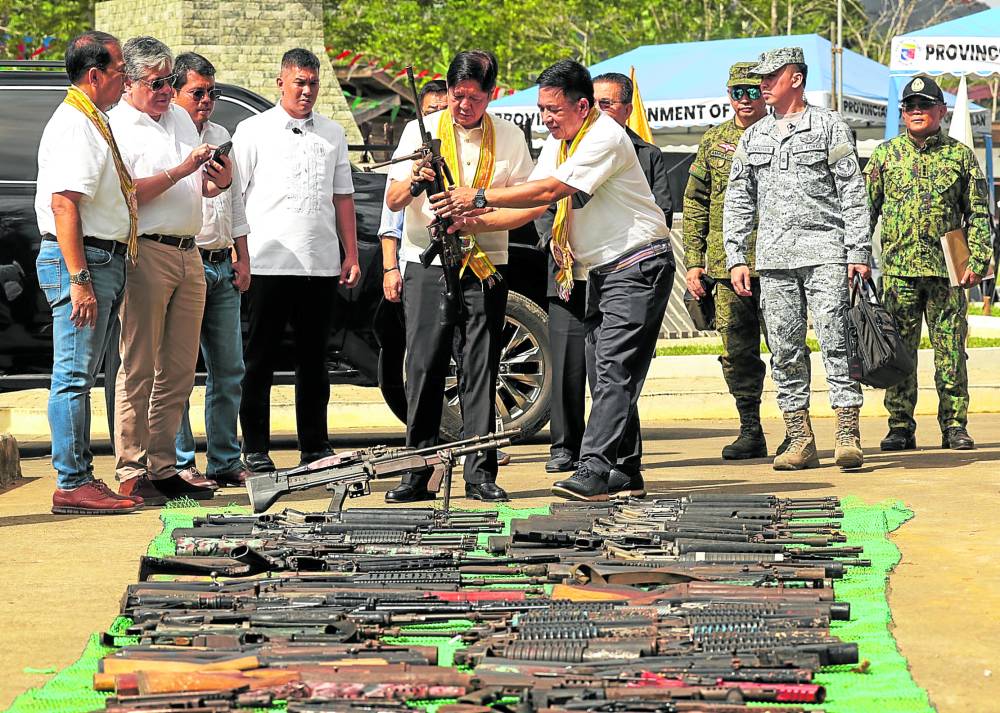Marcos vows boost to dev’t of Basilan

LET THERE BE PEACE President Marcos examines a surrendered rifle before its destruction in Basilan on Saturday. —PPA POOL
SUMISIP, BASILAN—President Marcos on Saturday set foot on a former stronghold of separatism and Islamic extremism in the country and vowed to renew the development that has evaded this island province for more than 50 years.
Mr. Marcos arrived in Mahatallang village at past 9 a.m. to grace the launch of the “Panabang si Kasanyangan” (Support the Peace) program, held in time for the province’s 50th founding anniversary.
He was the fourth President to have come to this formerly no-go island province. The first was his father in the 1970s to inaugurate the establishment of Mahatallang, a farming resettlement for former Moro guerrillas. The second was former President Benigno Aquino III in 2015 and the third was former President Rodrigo Duterte in 2016 and 2019.
But he was the first to visit the so-called Sampinit Complex, a stronghold of the Moro National Liberation Front (MNLF), which started the 50-year insurgency after the Jabidah Massacre in 1968.
When the MNLF signed a peace deal with the government in 1996, the Abu Sayyaf group, whose core leadership was those who split from the MNLF, took over the area. Hence, it has become the centrum of banditry and terrorism operations not just in Basilan but in the country’s southern region.
Article continues after this advertisement“I am the first President to be able to come here to ground zero,” Mr. Marcos said in a chance interview.
Article continues after this advertisementMr. Marcos took the presidential chopper from Zamboanga City to Tumahubong village, which was also marred by violence, the most gruesome of which was the March 2000 hostage taking of more than 70 schoolchildren, teachers and Claretian missionary priest Rhoel Gallardo.
But things have changed in this former warzone. The President was greeted upon arrival by cheerful plantation workers with no elaborate military security cover in sight, except for four armored personnel carriers that were half a kilometer away from the event venue.
550 weapons destroyed
The President witnessed the decommissioning and destruction of 550 small arms that were turned in by former Moro rebels, Abu Sayyaf bandits and ordinary civilians.
The Army used a payloader to roll over the weapons displayed on the pavement. Lamitan City Mayor Roderick Furigay told the Inquirer that he estimated the destroyed weapons to cost about P20 million.
“I am very happy to be here in a beautiful, bountiful and breathtaking Basilan. Our presence in today’s event reaffirms the truth that what was once a ground zero of war is now turned into an epicenter of peace,” Mr. Marcos said.
He acknowledged that Basilan, which was once tainted by violence and terrorism, is now a zone of peace. He emphasized that it was not so much due to military might “but more-so by our people saying ‘no’ to violence.”
“Peace is more than just a cessation of hostilities, it is about the creation of a social order that values human dignity, improves lives and promotes progress,” Mr. Marcos pointed out.
Basilan, he noted, is twice as large as Singapore, and has a lot of agricultural and fisheries potential.
“Basilan’s new role is now the war against hunger. You have a land area twice the size of Singapore, blessed with a rich soil, above-all more or less typhoon-free, which makes you an ideal bulwark in our fight for food security,” he said.
He vowed government help to make the province another food basket for the country, after security concerns that pushed it to underdevelopment for a long time had eased.
Still many pending issues
Even before the MNLF inked a peace deal in 1996, the Abu Sayyaf had already become the main purveyor of violence in the province shortly after it was organized in 1989.
The first Abu Sayyaf members were young people, mostly related to MNLF fighters who were slain or experienced atrocities committed at that time or the 1976 Moro Gulf earthquake and tsunami that killed thousands of Mindanao folk.
Islamist fundamentalism, brought to the country by veterans of the Soviet-Afghan War in the 1970s, conflated the economic and socio-political grievances of the Moro insurgency.
A joint program by the Army, the then ARMM, and a nongovernmental organization lured the former bandits back into the folds of the law through generous socioeconomic incentives and a reintegration program. The same initiative has been continued by the provincial government under Gov. Jim Hataman-Salliman.
READ: Gov’t to help unravel Basilan’s ‘agri-fisheries potential’ – Marcos
“Peace is totally achieved not when the sound of gunfire was ended, it is when the clamor of better has been met. This is the kind of peace that we see dawn off here in Basilan,” Mr. Marcos noted.
“This is the kind of peace where the depressing tally of casualties of war must be replaced by the statistics of human development. The kind of peace that endures because it uproots the causes of people’s discontent that purveyors of violence may want to exploit. This is the kind of peace that draws strength from the free will of the people instead of commanding their religion by force,” the President added.
Sumisip Mayor Jul Adnan Hataman said he also wanted the President to increase the government’s investment into the reintegration program for former Abu Sayyaf bandits.
“We have so many former Abu Sayyaf who surrendered but sustainability is a big challenge to ensure they will not go back to the life they used to live,” he told the Inquirer.